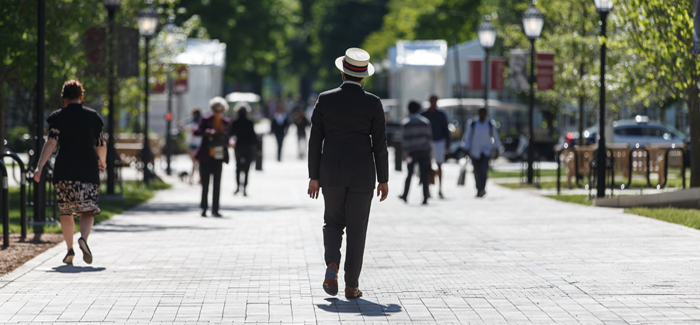
On the main quad during Alumni Weekend 2014. (Photography by Jason Smith)
Alumni award recipients share dinner and reminiscences.
The alumni awards ceremony held in Rockefeller Chapel the Saturday morning of each Alumni Weekend is an august occasion, complete with bagpipe procession and presidential remarks. This year’s alumni awards celebration dinner, held on the eve of the ceremony, had a less formal atmosphere. The new class of 15 awardees gathered with family members at Hyde Park’s La Petite Folie, taking turns sharing life stories and Chicago memories. Widely varied by profession, politics, and generation, they were united in camaraderie.
The first speaker, sportswriter Lester Munson, JD’67, shared an Alumni Service Award with his wife Judith, AB’63. The father of former varsity football player Lester Munson III, AB’89, the elder Lester reminisced about another dinner: a banquet he and Judith helped organize for the football team. The task of inviting then-president Hanna Holborn Gray fell to Lester. “The first challenge was to inform Hanna Gray that there was a football team,” he said, inspiring laughter among the diners. “Once I got through that, the rest was easy. She said no.”
Young Alumni Service Award recipient Luke Rodehorst, AB’09, took the microphone next. His graduation five years ago was “bittersweet” until he realized, “I wasn’t going to be leaving the University of Chicago behind. I was going to be entering a different relationship with the University.” Through volunteer work he has tried to deepen that relationship—“that really is what drives me”—serving on alumni club boards in Chicago, Detroit/Ann Arbor, and Washington, DC. He also created an alumni group of the Chicago Men’s A Capella.
Lloyd Rudolph, professor emeritus of political science, shared a Norman Maclean Faculty Award with his wife, Suzanne Rudolph, Benton distinguished service professor emerita in political science. Lloyd sang the praises of fellow award recipient and Vermont senator Bernie Sanders, AB’64, who was given a Public Service Award. “We are residents and voters in Vermont. We are represented by Bernie Sanders,” he said to laughter and applause. “We even send him money from time to time.”
Gabrielle Selz, daughter of art historian and Professional Achievement Award recipient Peter Selz, AM’49, PhD’54, spoke in her father’s place; at 95, he was too ill to travel. Peter Selz fled Nazi Germany at 17, she said. Ten years later, he was able to attend UChicago on the GI Bill. “This community gave him back a part of his life that he felt had been taken away from him and lost,” she said. “It was incredibly important to him.”
Wall Street Journal columnist Bret Stephens, AB’95, who received a Professional Achievement Award, confessed that “most of my memories at the University of Chicago involve moments of searing intellectual humiliation.”
Cardiologist C. Noel Bairey Merz, AB’77, who also received a Professional Achievement Award, explained that she came to Chicago as the first recipient of the Gertrude Dudley Scholarship—an academic-athletic scholarship for women, spearheaded by Mary Jean Mulvaney, then athletics director. There were few opportunities for women athletes at the time, and Merz, a nationally ranked swimmer, jumped at the opportunity (even though the Ida Noyes pool was not regulation length and lacked both lanes and gutters). For any contributions she has been able to make to women’s health since then, Merz said, “I thank the University of Chicago and Mary Jean Mulvaney.”
Law professor Richard Epstein, who received a Norman Maclean Faculty Award, began by pointing out three former students in the room. In 42 years at UChicago, he has racked up “10,000 students or so,” he said, a number that continues to grow despite his emeritus status. He still returns to teach, energized by the “perpetual intellectual turmoil” he encounters. “Everybody here, from students to faculty, believes that you’re only as good as your last day’s work,” Epstein said, “and you can never sit and rest on your laurels.”
Public Service Award recipient Michael Shakman, AB’62, AM’64, JD’66, likewise goes way back with the University—but his long history was not the claim to fame he thought it was. “I was actually born at the University of Chicago,” Shakman noted. “I suspect not very many of you can make that claim.” Surprisingly, four other diners could; there were more Chicago Lying-In Hospital babies in the room than Epstein students.
“I’m best known for the lawsuit that bears my name. That lawsuit was filed in 1969,” he continued. (The resulting “Shakman decrees” outlawed patronage hiring in Chicago.) “That’s 44 years. I’ve been able to boil it down to ten minutes a decade. So sit back, relax, and get ready.” His listeners, after a couple of courses of food and wine, laughed uproariously. “But that talk isn’t going to be given. That’s because three minutes ago, the White Sox started to play in Anaheim.”
Sanders, the evening’s final speaker, reflected on all he learned in four years at UChicago.“Truth be told, most of it was not in the classrooms, but out on the streets.” In Chicago he formed the ideas about social justice, war and peace, and racial justice that have informed his political career. “What I learned in the basement of the Harper Library, and what I learned in the streets of Chicago, has stayed with me my whole life.”
As the dinner concluded, a small crowd clumped around Sanders. Young Alumni Service Award Jenna Beletic, AB’07, was hoping for a selfie with the man who has hinted at a possible 2016 presidential run. She achieved her goal.
